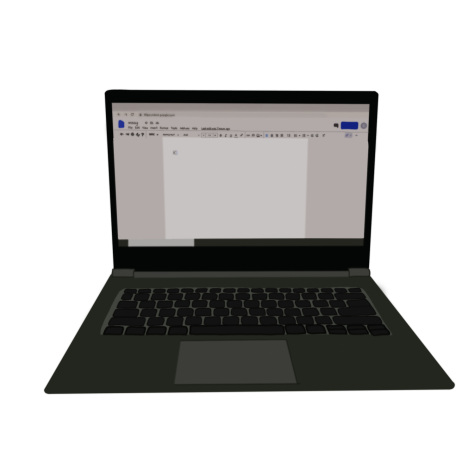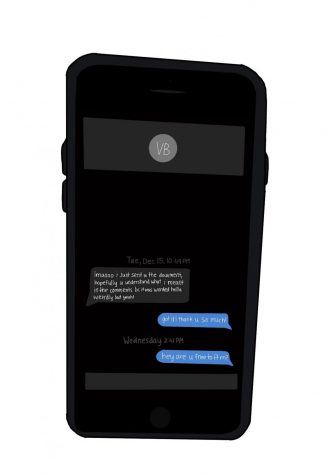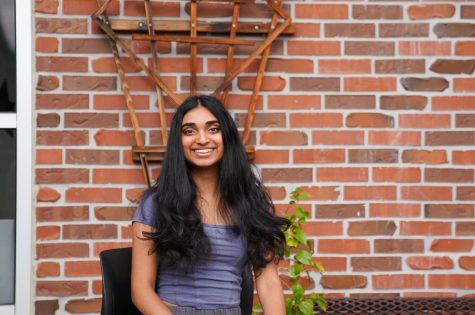Envisioning the “new normal”
Why the prospect of our lives going back to normal is terrifying
February 11, 2021
It seems like every day I tell myself I’ll be asleep by midnight, but as the hour hand on my clock ticks past 12, I painstakingly grind away at my work. Five more minutes, I say, but I know that this is just another lie. As minutes turn into hours, I check webtoon and manga websites to see if the next chapter of the story I barely care about has been updated, just for the sake of giving my brain something to focus on that isn’t work. My vision begins to blur from the light, eyes drooping shut as I agonize over the assignment I’ll never get done. It’s a constant cycle, one that has repeated almost every day for months. Every day feels the same.
Although the monotony is boring, it has become routine. We now have potential vaccines for COVID-19 that are being distributed among healthcare workers, first responders and senior citizens. As more people get access to the vaccine, going back to school in person seems like it isn’t as far away anymore. The prospect of attending school in person is somewhat exciting but also utterly horrifying, as the potential for returning to normalcy is daunting.
I can’t remember what it was like to be able to see my friends in person every day. I miss physical interaction, making new friends and talking to those people in my classes who weren’t close enough to call friends but too close to call strangers. While I am excited for those parts of my life to return, there are quite a few concerns that I can’t stop thinking about.
For one, I’m fairly certain that I’m incapable of waking up on time. My alarm blares at 7:30 a.m., but every day, I turn it off without hesitation. The second time it goes off, 5 minutes later, I stretch out to silence it again, with just a little more irritation. Every five minutes I’m faced with the grueling task of moving my arm about two feet away from me to press a button until I finally crawl out of bed and prepare myself to plead my case to my teacher if I’m late.
Thus, having to actually go to school in-person is something I don’t even want to think about. I need time to eat, get ready and make the commute to campus. The mere idea of losing even five minutes of sleep is absolutely terrifying, let alone the half hour this “new” routine would cost.
Looking back on a normal school day of my freshman year, I can’t fathom how I got anything done. Everything required movement — going to school, running from class to class, playing sports, attending club meetings. Even though our classes are now online and I don’t have to take time out of my day to actually go anywhere, I never have the energy to actually do anything.
Following that fateful announcement which marked the closing of schools back in March of 2020, the biggest blessing and also the most unforeseen obstacle coming into this pandemic was all of the free time I suddenly had. Teachers assigned less homework, and classes and extracurriculars continued online (albeit for much shorter lengths of time than they were in person). With this newfound time, I found myself trying to do as much as possible in a single day — I spent hours painting, FaceTiming my friends and watching anime. Sleep was nowhere on the list of “things to do,” and I began going to bed later and later.
 I now have more time to do homework and study, but it never seems like enough. The list of assignments to finish is never-ending, and it’s hard to be productive when your classes, homework and even talking to friends is done while staring at a screen. I spend more time than I’d like to admit doing homework in class instead of classwork so I can get everything turned in on time. Even though we most likely have months to go before in-person schooling begins, not being able to do homework during class and having even less time to finish assigned work is a frightening concept.
I now have more time to do homework and study, but it never seems like enough. The list of assignments to finish is never-ending, and it’s hard to be productive when your classes, homework and even talking to friends is done while staring at a screen. I spend more time than I’d like to admit doing homework in class instead of classwork so I can get everything turned in on time. Even though we most likely have months to go before in-person schooling begins, not being able to do homework during class and having even less time to finish assigned work is a frightening concept.
But it’s not just the grueling academic stress or time management issues that I’m afraid of when in-person school starts, but the idea of interacting with people face to face is also intimidating. It’s not that I dislike talking to people; I actually do prefer spending time with others over being by myself. It’s just that the sheer skill required to navigate in-person conversations just wasn’t evident until they stopped, and the prospect of meeting people physically and conversing smoothly seems so alien.
Texting people and FaceTiming are so different than talking in real life. Texting is such an easy method of communication — you can plan out your responses, and if you don’t feel like responding to someone immediately you can take your sweet time and they would be none the wiser. Not to mention having to see the people I’ve accidentally overshared to at 3 a.m. in person. Imagining talking to them face-to-face for the first time without having anything to act as a buffer is not a pleasant thought.
I’d compare this to the beginning of my freshman year, when making friends was a bit difficult initially because not many people were from my middle school. Coming back from a pandemic in which I’ve lost contact with the majority of people I talked to last year feels the same, but reaching out to people who I found intimidating or scary was a necessity when we met each other in person. Now that I haven’t had a reason to reach out to people who aren’t my friends, I feel like I’ve forgotten how.
Going to bed on time, eating at normal times and exercising regularly — all the habits I’ve been working to cultivate for the past few years have just fallen apart. It took me most of my life to figure out how to balance all of that, and just when I was starting to get the hang of it, everything reverted back and all of my progress was gone when the pandemic started. And it’s not like I can just build those habits back up in weeks.
Maybe I’m making a big deal out of nothing, and our lives going back to “normal” won’t be as scary as I think it is. There are definitely actions that I can take to ease concerns, like working on my time management, establishing work priorities and maybe even video calling people who I haven’t spoken to in a while.
 But the biggest thing to keep in mind is that these concerns apply to everyone else as well. Nobody knows what our “new normal” will look like, or even when it’s going to come. Getting used to having even less time in our schedules will be a challenge for everyone. In-person conversations with people we barely know isn’t a familiar concept to most anymore — nobody knows how they’re supposed to just go about their lives again.
But the biggest thing to keep in mind is that these concerns apply to everyone else as well. Nobody knows what our “new normal” will look like, or even when it’s going to come. Getting used to having even less time in our schedules will be a challenge for everyone. In-person conversations with people we barely know isn’t a familiar concept to most anymore — nobody knows how they’re supposed to just go about their lives again.
We are all going to struggle together, as nobody is going to be accustomed to living life that way. Awkwardness is an inevitable part of human interaction. Time management is something we’re all going to have to work on. We’re all going through the same thing, and being concerned about what our lives are going to look like is normal. We should hold ourselves accountable to the same standards that we have for our peers, meaning that we shouldn’t be too harsh on ourselves or anyone else.
And of course the pandemic getting better isn’t a bad thing. Less COVID-19 cases and people getting sick, not coming to school as often when you’re sick and being able to finally see friends in person again are all great things that come out of the pandemic ending. Being in an actual classroom setting and environment is also a welcome change, as I miss talking to my classmates.
We can finally see the light at the end of the tunnel that we’ve sought for so long. But after being in the darkness for so long, maybe the light can be a little scary. Regardless, we inch closer to it with every day and every bit of progress as we wait with bated breath for our lives to slowly return to normal.

















